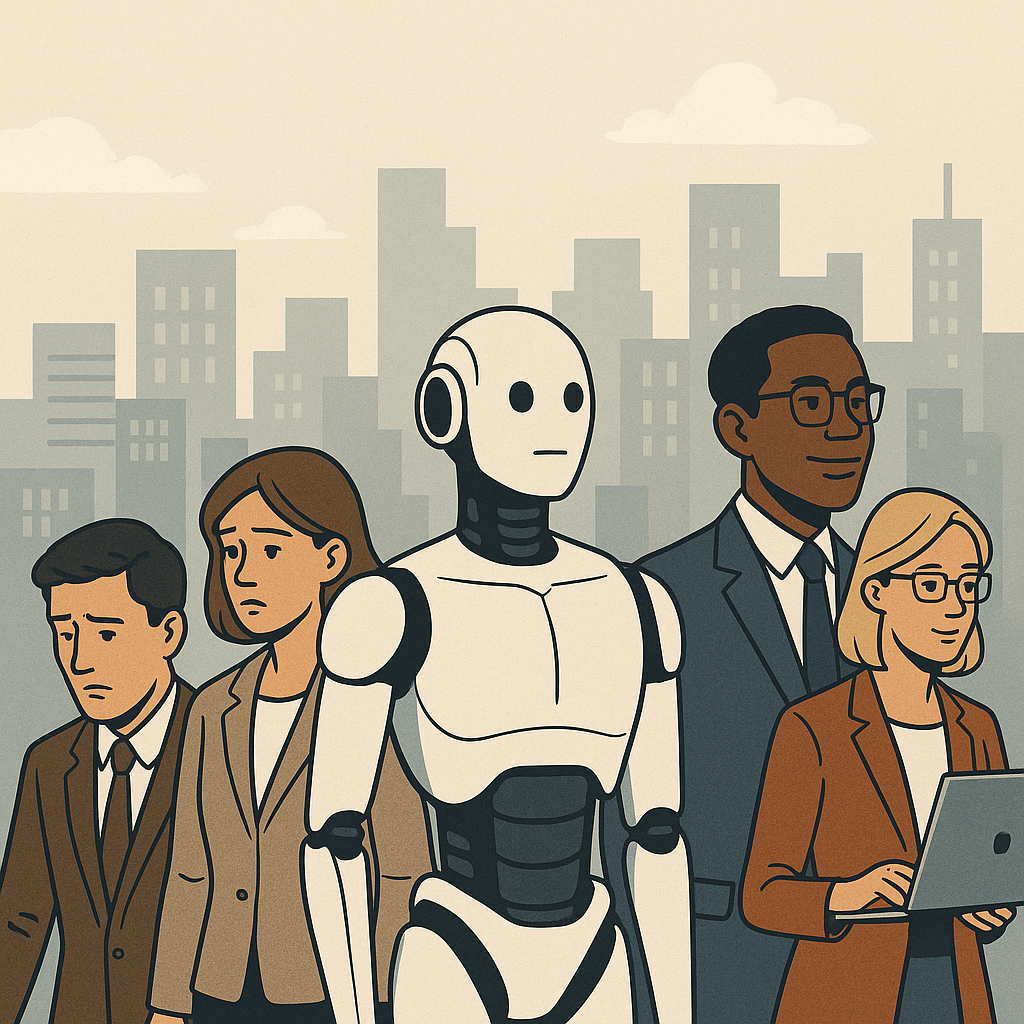
In 2025, the global job market is undergoing the most significant transformation since the Industrial Revolution—and artificial intelligence is at the center of the disruption.
What once sounded like science fiction has become a daily reality. AI systems are now routinely handling customer service calls, writing reports, designing logos, managing inventory systems, and even performing basic legal reviews. While this shift has sparked widespread concern about job displacement, it has also created a parallel movement: professionals who embrace AI are not only retaining relevance—they’re unlocking new levels of opportunity and income.
A recent report from the World Economic Forum projected that 85 million jobs worldwide will be lost to automation by the end of this year. Occupations most vulnerable include clerical work, retail roles, data entry, and front-line support staff—jobs where repetition and rule-based functions are common. These positions are increasingly being replaced by AI-powered platforms that operate faster, more accurately, and at a fraction of the cost.
However, the story doesn’t end there. The same report forecasts the creation of 97 million new roles, many in fields that didn’t even exist a few years ago. These emerging roles—ranging from AI operations specialists to data privacy officers and digital ethicists—are defining the next phase of the global workforce.
This dual reality has created what economists are calling the “AI Skills Gap.” On one side, millions of workers face obsolescence. On the other, those who understand and leverage AI are experiencing accelerated career growth, high demand, and in many cases, increased financial independence.
Among the fastest-rising positions in 2025 are AI prompt engineers, who specialize in crafting effective inputs for language models like ChatGPT and Claude. These individuals help companies optimize everything from marketing content to internal communications, often without a background in coding. The only real requirement? Knowing how to ask the right questions and speak the “language” of AI systems.
Another booming area is automation workflow design, a skill set involving the integration of AI tools like Zapier, Make, and Airtable to reduce manual workloads. Businesses, particularly startups and lean organizations, are relying on automation experts to cut costs, boost productivity, and free up human labor for more strategic tasks.
This shift has not been confined to the corporate world. Thousands of freelancers, creators, and remote workers are forming a growing class of “micropreneurs”—individuals who run profitable businesses powered largely by automation. These one-person operations rely on AI for everything from copywriting and social media management to scheduling and analytics. With the right tech stack, they can outperform teams ten times their size.
“AI didn’t just change how I work,” said 32-year-old digital strategist Anika Rao, who runs a solo agency serving global clients from her apartment in Lisbon. “It changed who I could work with, how fast I deliver, and what kind of clients I attract. I no longer need a team of five to scale my services.”
Meanwhile, traditional organizations are feeling the pressure to keep up. Many are investing in AI training programs to re-skill employees, while others are opting to hire externally—prioritizing candidates with AI fluency over those with conventional degrees. In many job listings, experience with Midjourney, or automation platforms is now featured as a preferred or required qualification.
At the same time, search engines have evolved to reward content written with expertise and human insight. With Google’s 2025 algorithm updates, SEO no longer favors keyword stuffing or machine-generated fluff. Instead, high-ranking pages are those that reflect subject-matter authority, helpfulness, and a clear understanding of reader intent. This has opened doors for writers, consultants, educators, and thought leaders who know how to blend human storytelling with data-driven insight.
The freelance economy is also benefiting from these changes. Platforms such as Upwork and Fiverr report a surge in demand for remote professionals who can combine soft skills—like communication and strategy—with AI-powered execution. Digital marketing, user experience design, and virtual assistance are just a few of the sectors experiencing dramatic evolution.
But not all reactions to AI are enthusiastic. Labor unions across Europe and North America have expressed concern about companies using AI to cut staff without offering upskilling support. Legislators in the United States are currently debating new frameworks to ensure ethical implementation of automation in both the private and public sectors. Similar discussions are happening in the UK, Canada, and India, as governments race to regulate the technology without stifling innovation.
Still, many experts say the outcome of this revolution will ultimately depend on how individuals respond.
“AI is not here to destroy jobs. It’s here to destroy tasks,” said Dr. Kenneth Morris, an economist and author of The Post-Workforce Economy. “The difference between success and stagnation will come down to whether you’re learning how to partner with AI or trying to compete with it.”
That sentiment is increasingly echoed by business leaders who view AI not as a threat, but as a multiplier. According to a 2025 Deloitte survey, 62% of executives said their companies had already seen measurable ROI from adopting AI tools—not by replacing employees, but by empowering them to do more with less.
Looking ahead, analysts believe the job market will continue its bifurcation: one path leading toward roles deeply integrated with AI and another leading toward obsolescence.
For individuals, the message is clear. Learning AI tools, building a digital presence, and cultivating human-centered skills like empathy, leadership, and strategic thinking are not just career enhancers—they are survival tactics.
“The era of safe, static jobs is over,” said Marlowe, the career consultant. “What replaces it isn’t just automation. It’s acceleration. Those who adapt fastest will own the future.”
As the dust settles in this new economy, one truth is becoming increasingly clear: in the AI age, the most valuable skill isn’t technical—it’s adaptability.

